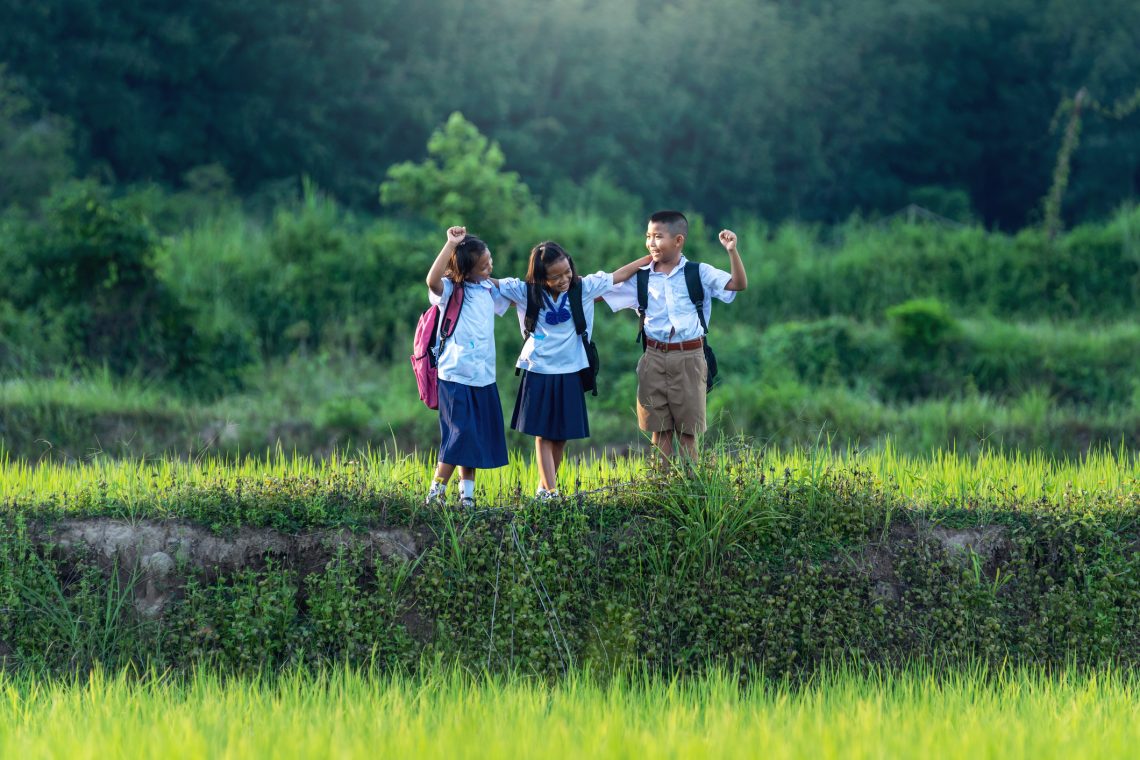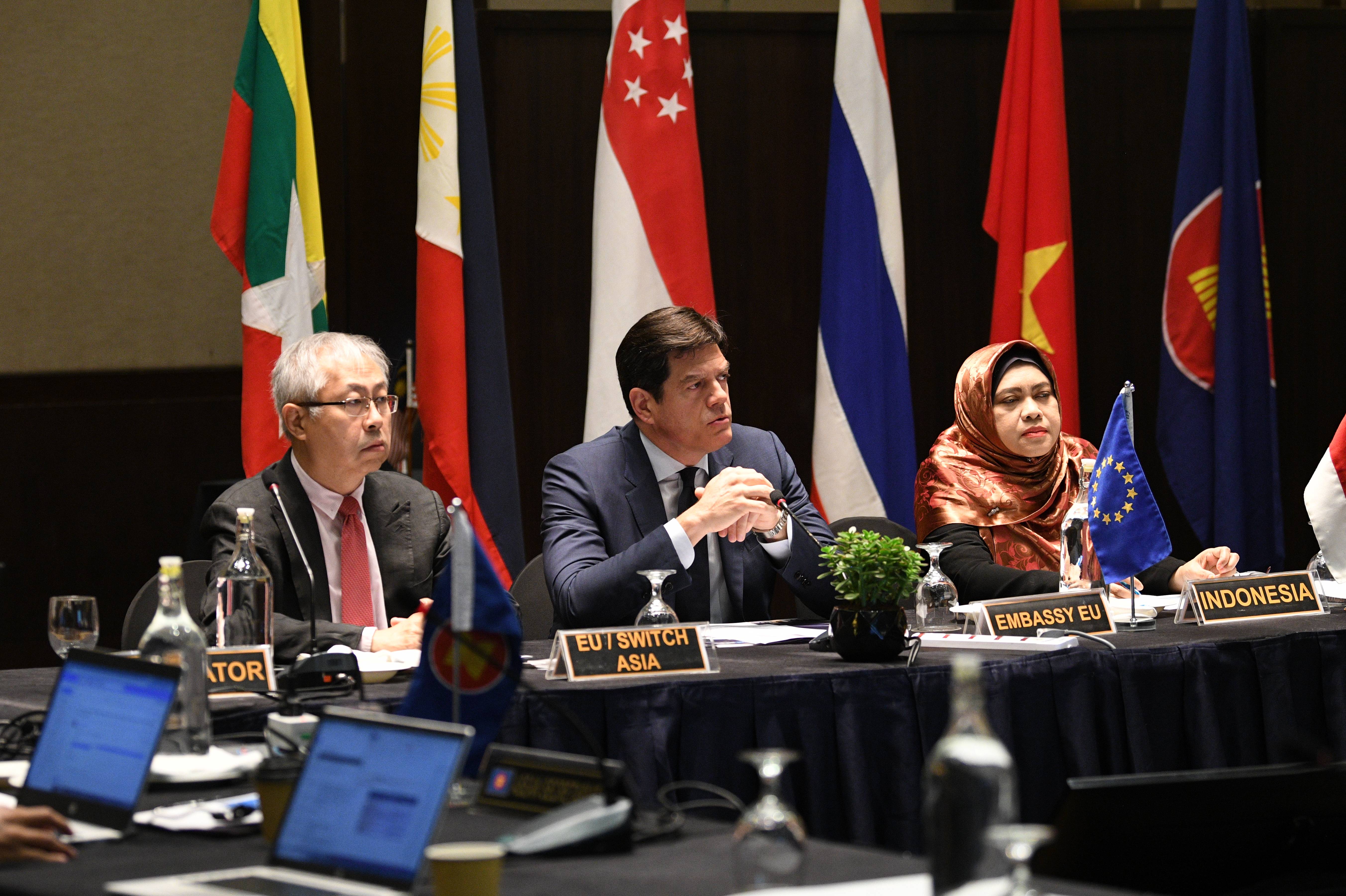
 |
Education is one of the most effective means to promote social development and community awareness on the importance of environmental sustainability. Education for Sustainable Development and Environmental Education (ESD/EE) plays a pivotal role in changing the mind-set and behaviour of communities including children, youths and adults to be responsible in maintaining a balance between environmental conservation and sustainable development.
Most ASEAN Member States are transitioning from an agrarian society to an industrialised society. This would necessitate using more natural resources to provide for the region’s growing population, economic development and urbanisation, as well as the increase in domestic consumption, infrastructure, transportation, facilities, and services. Resource use and consumption patterns are increasing in line with expanding urbanisation and industrialisation. Although efficiency and productivity are increasing, improved waste and sustainable consumption and production management is needed across the ASEAN region.
The overall pattern of production and consumption shows an increasingly unsustainable trend across ASEAN Member States and needs to be urgently tackled. ASEAN needs to move forward into 3R (Reduce, Reuse, Recycle)/circular economy, green finance and ecolabelling for improving its resource and production sustainability. It also needs to foster efforts including awareness raising, capacity building, creation of databases and ratification of International Conventions, to address issues of environmental management and sustainable production and consumption.
In 2002, the United Nations General Assembly proclaimed the UN Decade of Education for Sustainable Development (DESD) 2005-2014, emphasising that ‘education is an indispensable element for achieving sustainable development'. Recognizing the fundamental role of environmental education in changing human behaviour towards the environment, all 10 ASEAN Member States have established national policy frameworks on environmental education and actively implement EE-related activities. Countries are also calling upon to address resource and process efficiency to achieve sustainable production and consumption of products. Both education and sustainable consumption and production are important goals (Goal 4 (Quality Education), and Goal 12 (Responsible Consumption) respectively) of the 2030 Agenda on Sustainable Development. At the regional level, the ASEAN Environmental Education Action Plan (AEEAP) was developed for the period of 2000-2005, 2008-2012, and 2014-2018 to serve as a roadmap of actions related to environmental education (EE) and Education for Sustainable Development (ESD) at national and regional level to contribute to the implementation of the ASCC Blueprint 2010-2025, ASEAN Work Plan on Education 2016-2020 and UN Decade of Education for Sustainable Development (DESD). However, in view of the development of ASPEN and the ASCC Blueprint 2025, ASEAN Member States reviewed the AEEAP 2014-2018 and integrated selected elements of AEEAP to Strategic Priority 6 or AWGEE Action Plan of the ASPEN.
ASPEN provides a forward-looking plan to promote cooperation and joint actions across ASEAN Member States that would allow for using education to sustainably address both environmental conservation and sustainable development. Efforts under this Strategic Priority will focus on four programmatic areas: (i) ASEAN Eco-school Programme, (ii) ASEAN Green Higher Education Programme, (iii) Regional Communication, Education and Public Awareness Initiatives, and (iv) Sustainable Consumption and Production.
Accomplishments
Some key programmes of AWGEE under the implementation of AEEAP (2000-2005), (2008-2014), and (2014-2018) include the ASEAN Eco-Schools Award Programme. The awards, first held in 2012 in Malaysia, were presented to a school from each ASEAN Member State representing Primary and Secondary Schools. These schools were nominated by the National Government based on their achievement and efforts in implementing the ASEAN Eco-Schools Programme according to the ASEAN Eco-Schools Guidelines. The second Eco-Schools Awards was held in 2015 in Myanmar back-to-back with the launching of ASEAN Environment Year 2015.
Other activities include the ASEAN Plus Three Youth Environment Forum (AYEF), a non-regular and voluntary based activity hosted by ASEAN Member States in cooperation with dialogue partners. Three AYEF were held in 2007, 2010 and 2012, respectively. The last AYEF was held in Singapore in 2016, supported by ASEAN Plus Three Cooperation Fund. ASEAN Member States have also developed and contributed to the ASEAN Environmental Education Inventory Database (AEEID), a comprehensive online environmental education directory which offers up-to-date and detailed information on schools, training, events and institutions related to environmental education for reference seekers. It also offers environment-related materials, publications, and resource persons1.
ASEAN Member States also took part in the ASEAN+3 Leadership Programme on Sustainable Consumption and Production, which supported capacity building for policy makers focusing on policy development and implementation, and upscaling and mainstreaming of sustainable consumption and production practices. It intended to expose policy makers to practical learning cases that demonstrate a change process from a business-as-usual scenario to one which effectuates, or can potentially influence, change in behaviour, practice and systems, as well as in policy making. The programme was held annually and supported by UNEP-SWITCH Asia, UNU-IAS Hanns Seidel Foundation, and UNIDO.
In terms of sustainable consumption and production patterns, ecolabelling of environmental products aiming to encourage changes in consumption patterns has been increasingly discussed at the regional level. Both Thailand and VietNam have already established regional cooperation on ecolabelling with other countries through, for example, the Asia Pacific Roundtable on Sustainable Consumption and Production. However, common core criteria are yet to be developed under these agreements and the Global Ecolabelling Network (GEN)’s ‘Internationally Coordinated Ecolabelling System’ has been suggested to assist countries, especially those without established eco labelling schemes2.
Objectives
Over the next 10 years, the main objectives of the AWGEE Action Plan is To promote environmental protection through effective environmental education and awareness programmes that enhance capacity and capability to adapt and respond to current and emerging environmental threats and challenges, so as to create a dynamic, sustainable, and resilient ASEAN Community that will proactively contribute to the achievement of global sustainable development goals.
Means of Implementation
ASEAN Working Group on Environmental Education (AWGEE) will be the main responsible body for implementation of the programmes and activities of this Strategic Priority Area. Other relevant sectoral bodies and/or partners such as the ASEAN Senior Officials Meeting on Education (SOM-ED) will be consulted for cross-sectoral and cross-pillar activities.
Activities related to sustainable consumption and production (SCP) will be implemented in coordination with the lead country for ASEAN cooperation on SCP (currently Indonesia) and other ASOEN working groups where relevant.
The AWGEE will oversee implementation of programmes and activities under this Strategic Priority, while the ASEAN Environment Ministers and the ASEAN Senior Officials on Environment will provide policy and strategic guidance for its work. Lead countries of each programme/activity under the strategic priority are expected to develop a detailed implementation work plan, implement the activity in coordination with AMS and ASEC, and provide regular progress updates to AWGEE.
As the issue of environmental education and sustainable consumption and production is likely to cross- cut other Strategic Priorities such as those on sustainable cities, chemicals and waste, and climate change, collaboration across relevant sectoral bodies responsible for such priority areas of the ASPEN will be key for successful implementation.
Potential Partners & Stakeholders
The activities under this Strategic Priority could be implemented through partnerships and regional collaborations with organisations working actively on environmental education and sustainable production and consumption. Potential partners or platforms include Southeast Asia Ministers of Education Organisation (SEAMEO), as well as Hanns Seidel Foundation, United Nations Environment Programme (UN Environment), United Nations Industrial Development Organisation (UNIDO), and United Nations Educational Scientific and Cultural Organisation (UNESCO).
Activities could also be implemented through cooperation and support from Dialogue/Development partners, for example, Japan International Cooperation Agency (JICA), Republic of Korea, China, Australia, and the European Union (EU).
Many development projects, such as USAID-funded Lowering Emissions in Asia’s Forests project, have contributed to curriculum development, which can be used to expand the efforts of AWGEE. The AWGEE can also liaise with ASEAN University Network (AUN), United Nations University-Institute for Advanced Study of Sustainability (UNU-IAS) and other relevant educational and research institutes for evidence-based knowledge and its dissemination in areas of environmental conservation and sustainable production and consumption.
Credits: ASEAN Foundation Photo Competition - PLANET CAMBODIA - The Awakening of Green Energy (2021)






